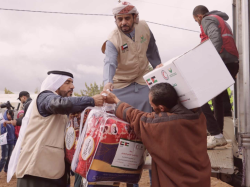How Covid-19 is threatening Central America's economic lifeline
- 2020-05-17 11:02:54


 Pierre Rayer: Art, Science, and Happiness: The Universal Mission of Transmission to Future Generations through Patronage at the Louvre Abu Dhabi
Pierre Rayer: Art, Science, and Happiness: The Universal Mission of Transmission to Future Generations through Patronage at the Louvre Abu Dhabi Ahly crowned Super champions after dramatic extra-time win over Modern Future FC
Ahly crowned Super champions after dramatic extra-time win over Modern Future FC Yemeni Honey..A Development Wealth Threatened By Conflict And Climate Change
Yemeni Honey..A Development Wealth Threatened By Conflict And Climate Change California wildfires: Millions warned of possible power cut
California wildfires: Millions warned of possible power cut Central African rebels launch attacks near capital
Central African rebels launch attacks near capital Yemen : Winter Clothing Campaign Launched in Taiz, Hodeidah with UAE Support
Yemen : Winter Clothing Campaign Launched in Taiz, Hodeidah with UAE Support At least 2 killed in Aleppo clashes between army and SDF
At least 2 killed in Aleppo clashes between army and SDF Mubadala partners with Actis to invest $352m in renewable energy firm Rezolv
Mubadala partners with Actis to invest $352m in renewable energy firm Rezolv Egypt, Foreign Ministry: ‘Italian woman dies in collision between two cruise boats on the Nile’
Egypt, Foreign Ministry: ‘Italian woman dies in collision between two cruise boats on the Nile’ Yemeni Commander Survives Roadside Bomb Attack in Shabwa
Yemeni Commander Survives Roadside Bomb Attack in Shabwa
